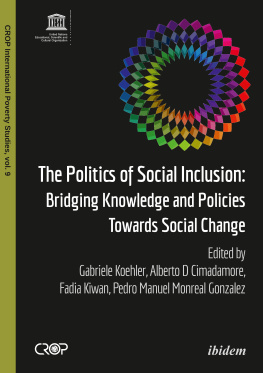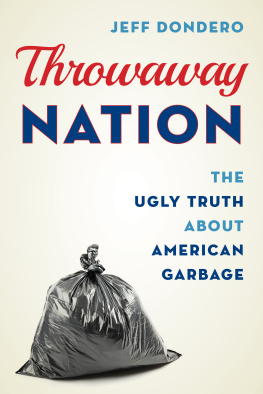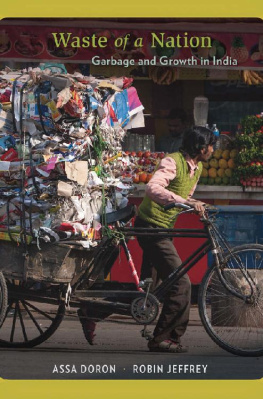Waste Worlds
ATELIER: ETHNOGRAPHIC INQUIRY IN THE TWENTY-FIRST CENTURY
Kevin Lewis ONeill, Series Editor
Mortal Doubt: Transnational Gangs and Social Order in Guatemala City, by Anthony W. Fontes
Contingent Kinship: The Flows and Futures of Adoption in the United States, by Kathryn A. Mariner
Captured at Sea: Piracy and Protection in the Indian Ocean, by Jatin Dua
Fires of Gold: Law, Spirit, and Sacrificial Labor in Ghana, by Lauren Coyle Rosen
Tasting Qualities: The Past and Future of Tea, by Sarah Besky
Waste Worlds: Inhabiting Kampalas Infrastructures of Disposability, by Jacob Doherty
Waste Worlds
INHABITING KAMPALAS INFRASTRUCTURES OF DISPOSABILITY
Jacob Doherty
UNIVERSITY OF CALIFORNIA PRESS
University of California Press
Oakland, California
2022 by Jacob Doherty
Library of Congress Cataloging-in-Publication Data
Names: Doherty, Jacob, 1984 author.
Title: Waste worlds : inhabiting Kampalas infrastructures of disposability / Jacob Doherty.
Other titles: Atelier (Oakland, Calif.) ; 6.
Description: Oakland, California : University of California Press, [2022] | Series: Atelier: ethnographic inquiry in the twenty-first century ; 6 | Includes bibliographical references and index.
Identifiers: LCCN 2021021910 (print) | LCCN 2021021911 (ebook) | ISBN 9780520380943 (cloth) | ISBN 9780520380950 (paperback) | ISBN 9780520380967 (epub)
Subjects: LCSH: Refuse and refuse disposalUgandaKampala. | Urban renewalUgandaKampala. | BISAC: SOCIAL SCIENCE / Anthropology / Cultural & Social | SOCIAL SCIENCE / Sociology / Urban
Classification: LCC HD 4485. U 332 K 36 2022 (print) | LCC HD 4485. U 332 (ebook) | DDC 363.72/8096761dc23
LC record available at https://lccn.loc.gov/2021021910
LC ebook record available at https://lccn.loc.gov/2021021911
Manufactured in the United States of America
31 30 29 28 27 26 25 24 23 22
10 9 8 7 6 5 4 3 2 1
For my parents
Contents
PART I
PART II
PART III
Illustrations
Preface
DONT YOU HAVE GARBAGE IN YOUR COUNTRY?
On the road that leads to Kiteezi Landfill on the outskirts of Kampala, traders have set up kiosks to deal in valuable rubbish. In the course of my research, I tried to interview as many traders as I could in the quiet periods when no one came to buy or sell the various recyclables collected at the landfill. At the end of these interviews I asked if the traders had any questions for me. One woman, a trader named Aisha originally from Eastern Uganda who specialized in cardboard, asked a question that has stuck with me: Mwetemulina kasasiro mu nsiyamwe? (Dont you have garbage in your country?) Indeed, we do.
I take Aishas question as essentially ethical: Why fly so far from home to study a problem you surely have there too? What makes her available as a research subject? Will she be proud of the image of her city that will result from this work? Are Ugandans especially wasteful, or uniquely impoverished? And if not (they arent), what makes this work meaningful? Would my questions be better posed to the worlds most powerful and prolific polluters, closer to home? Doesnt there appear to be a disjuncture between the most significant causes of global pollution and climate change in the Anthropocene and ethnographic research at the peripheries of an African city?
This book is an effort to describe Kampalas waste worlds in a way that renders their inhabitants as embodying neither an exotic alterity nor a universalized abjection. Waste streams are rarely local or neatly bounded. On the contrary, they tie localities together. They are the photographic negatives of the commodity flows defining planetary urbanism. Methodological nationalism is entirely inadequate for the scales and connections of the Anthropocene. The traders, salvagers, informal waste collectors, community-based developers, volunteers, youth groups, artists, politicians, and government officials that I came to know in Kampala inhabit the same world as recyclers on the streets of Oakland, Philadelphia, and New York, the cities where much of the writing for this book has taken place. Equally, they inhabit the same world as industrial polluters from the extractive sector to the petrochemical industry to high-tech Silicon Valley chip producers. Waste here and waste there are not discrete social and environmental problems to be theorized independently. My interlocutors in Kampala are thinking and working through some of the most important problems of the environmentally devastated world we all, however unevenly, occupy. How to improve the living conditions of the planets poorest people without relying on destructive fantasies of endless growth? How to build inclusive cities? How to clean these cities without perpetuating the violence of displacement? They are working through these problems, but they are not the problems. I hope Waste Worlds conveys something of what I have learned with and from (and sometimes against) their thinking.
I first arrived in Uganda in 2010 interested in the oil economy, urbanization, and the politics of work in a transnational industry that has little space for local labor despite the amount of capital involved. I moved away from this project because the pace of oil development appeared slower than even the pace of a PhD project, and because of the ethical risks that would be involved in talking to displaced people in the context of speculative and militarized land-grabbing in Ugandas oil producing regions. But while I was in Kampala conducting preliminary research, I found that environmentalists and others I was meeting were always returning to the theme of the citys garbage. Pointing to rubbish at the side of the road as we walked from his office, one environmental activist told me that these heaps of garbage are evidence of the political failures of the state and a dangerous harbinger of how badly oil extraction could go. But these heaps meanings were not stable. Another man on another walk together told me that the trash littering the roadside was evidence of the moral failure of the population to live properly and take care of their city and their environment. The recurrence of the theme, and the contradictory ways in which Kampalans treated it, sparked my interest, especially as it articulated with my own past dumpster diving and politicizing food waste as part of Food Not Bombs activism in Virginia. In the coming year, Kampalas municipal government itself brought waste to the forefront of the citys politics in a campaign to remake urban politics and the visual environment. So I started to track the ways that ideas about waste emerged in the city, how global environmental discourses were taking shape there, and how Kampalas residents differentially engaged with and crafted lives from the citys discards.
Like many ethnographers seeking to study global processes, my research had to be multi-sited. In my case, however, this did not mean that I traveled far beyond the boundaries of Kampala. Rather, I was interested in how the city itself becomes multiple and fragmented and in the various seams and streams that unite and cut across these fragments. One of the first, and methodologically foundational, things I learned about Kampalas waste infrastructure was its ephemeral nature. Waste management organizations existed transiently and struggled to sustain themselves. By the time I arrived to do my research proper, two of the groups I had intended to study after my preliminary research visits were no longer present. One had relocated its projects to a smaller town in western Uganda, and the other collapsed when they lost access to the land they had been using. Other groups I came to know had a fleeting existence, coming together for intense afternoons or weekends of work, before members returned to the other activities that occupied their lives and earned their livelihoods. The municipal government had a more established and continuous presence (the everyday construction of which is described in part 1), but although municipal officials were welcoming of my requests for interviews and availed themselves generously when I asked to shadow them on their day-to-day routines, they were reluctant to permit me a more embedded role. Kampalas waste infrastructure thus offered no simple site in which I could achieve classic ethnographic immersion. Instead, it forced me to track difference and connection across diverse worlds of waste and projects of urban cleaning.






